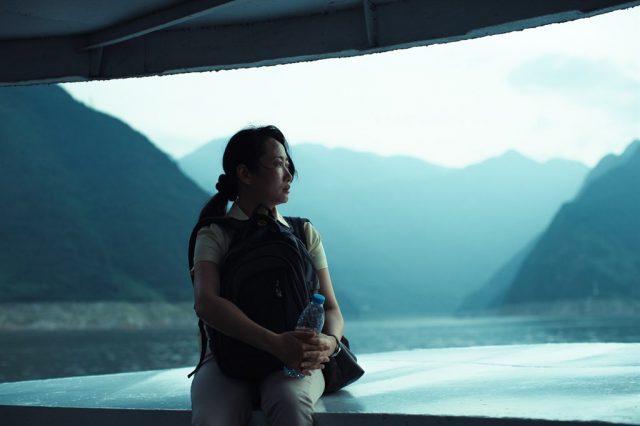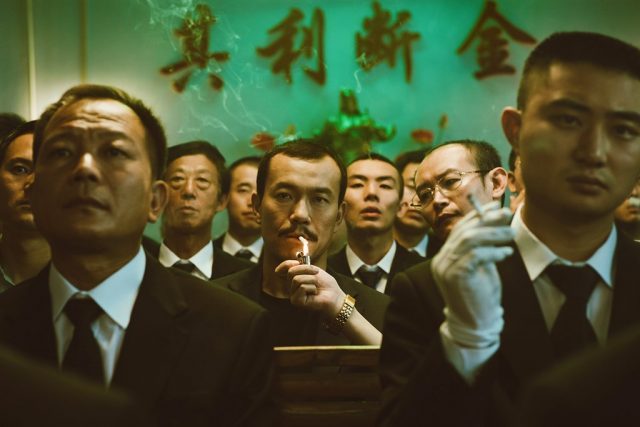
Qiao (Zhao Tao) how her life is turning out in Jia Zhang-Ke’s Ash Is Purest White
ASH IS PUREST WHITE (Jia Zhang-Ke, 2018)
Museum of the Moving Image
35th Ave. at 36th St., Astoria
Saturday, January 4, 7:00
Series continues through January 12
718-777-6800
www.movingimage.us
www.ashispurestwhitemovie.com
 Museum of the Moving Image curator Eric Hynes and assistant curator Edo Choi look back at the best of 2019 in its annual series “Curators’ Choice,” consisting of a wide range of works from different platforms, from movie theaters to streaming sites. On January 4 at 7:00, MoMI turns its attention to Jia Zhang-Ke, who reaches into his recent past, and China’s, in his elegiac Ash Is Purest White. In the film, the Sixth Generation writer-director’s wife and muse, Zhao Tao, stars as Qiao, a combination of the characters she played in Jia’s 2002 Unknown Pleasures and 2006 Still Life. It’s the spring of 2001, and Qiao is living in style with her handsome, ultracool jianghu boyfriend, well-respected local gangster Guo Bin (Liao Fan). She runs a gambling parlor, where she asserts her power with men who are in awe of her. But when a rival gang attacks Bin and Qiao pulls a gun, their lives take a series of unexpected turns as the story moves first to 2006 and then to 2018, when things are decidedly, and sadly, different for both of them in a China that has changed as well.
Museum of the Moving Image curator Eric Hynes and assistant curator Edo Choi look back at the best of 2019 in its annual series “Curators’ Choice,” consisting of a wide range of works from different platforms, from movie theaters to streaming sites. On January 4 at 7:00, MoMI turns its attention to Jia Zhang-Ke, who reaches into his recent past, and China’s, in his elegiac Ash Is Purest White. In the film, the Sixth Generation writer-director’s wife and muse, Zhao Tao, stars as Qiao, a combination of the characters she played in Jia’s 2002 Unknown Pleasures and 2006 Still Life. It’s the spring of 2001, and Qiao is living in style with her handsome, ultracool jianghu boyfriend, well-respected local gangster Guo Bin (Liao Fan). She runs a gambling parlor, where she asserts her power with men who are in awe of her. But when a rival gang attacks Bin and Qiao pulls a gun, their lives take a series of unexpected turns as the story moves first to 2006 and then to 2018, when things are decidedly, and sadly, different for both of them in a China that has changed as well.

Things are about to change for Guo Bin (Liao Fan) in Ash Is Purest White
As in many of his fiction works, Jia includes documentary elements as he touches upon China’s socioeconomic crisis, primarily exemplified by the Three Gorges Dam project, which led to the displacement of families and the literal disappearance of small communities. Working with a new cinematographer, Eric Gautier, who has lensed films for Olivier Assayas, Walter Salles, Leos Carax, Alain Resnais, and Arnaud Desplechin, among others — his longtime cameraman, Yu Lik-Wai, was unavailable — Jia incorporates general footage he shot between 2001 and 2006 of everyday people and architecture that underscores China’s many changes. There are many gorgeous shots of towns and cities, at one point bathed in white volcanic ash, with costumes of bright yellow, red, and blue, as Gautier goes from digital video to Digibeta, HD video, film, and the RED Weapon camera to add distinct textures. (Jia took the title from what was supposed to be Fei Mu’s last work, which was later made by Zhu Shilin.)
Qiao and Bin try to go back, but little is the same, except for some of their old friends, who are still trying to hold on to the way things were. Zhao (A Touch of Sin, Mountains May Depart) is slow and deliberate as Qiao, her wide eyes telling a story all their own as she wrestles with disappointment, searching for some meaning in her life, while Fan (The Final Master; Black Coal, Thin Ice) is bold and forceful as a proud, powerful man who undergoes a radical shift. “The city is developing fast. It’s ours for the taking,” Bin says early on. But in Jia’s moving, heartfelt epic, there’s nothing for them to grab on to anymore. “Curator’s Choice 2019” continues through January 12 with such other gems as Apollo 11, with director Todd Douglas Miller in person; Homecoming: A Film by Beyoncé, with editor Alexander Hammer; American Factory, with Julia Reichert, Steve Bognar, and Jeff Reichert; Hail Satan?, with director Penny Lane; and The Hottest August, with Brett Story.